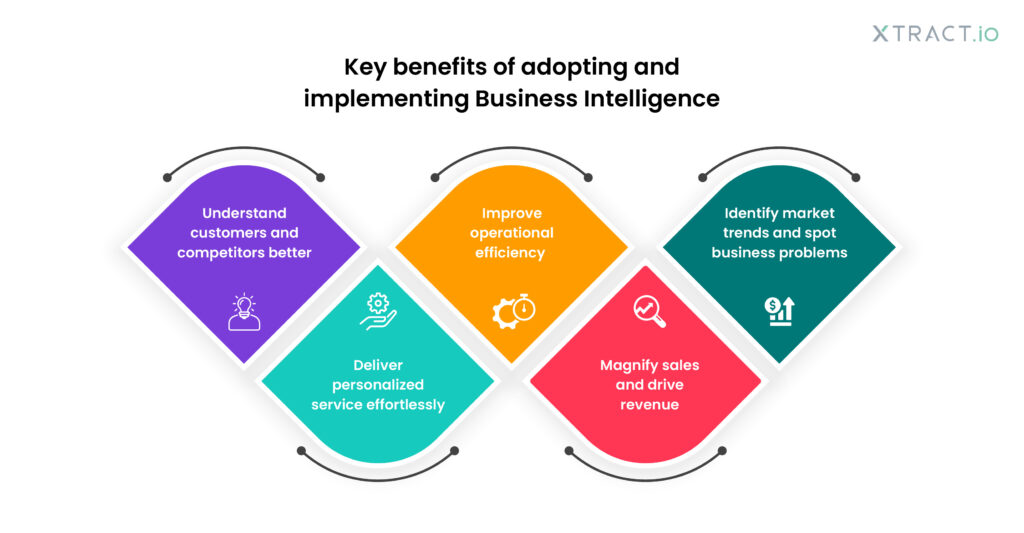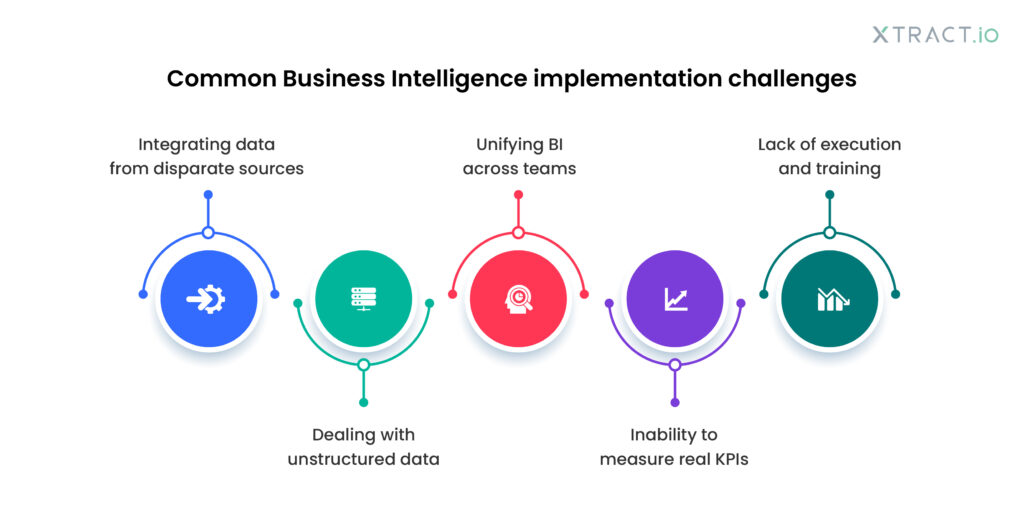We live in an era of information technology. Therefore, the potential to use data in real-time is the key to success for any business. There are about 2.5 quintillion bytes (2.5 with 18 zeros) of data generated every day. Today, no matter what industry or business you are in, you need quick access to quality data to make intelligent business decisions. Although, you need to understand that data itself is not powerful unless transformed into meaningful information, and that’s where business intelligence comes into the picture.
Let’s start with the basics.
Understanding business intelligence
Business intelligence (BI) is a technology-led process that analyzes data and delivers actionable insights to help businesses make informed decisions. Business intelligence tools capture and analyze datasets and present the information through reports, dashboards, charts, and graphs to provide users with a complete picture of their business.
The end goal of BI implementation is to enable informed decision-making. Through BI, organizations can increase their revenue, enhance operational efficiency, and gain a competitive advantage in the marketplace.
Digging deeper into the benefits of business intelligence
Business Intelligence is more than using the software. It is a holistic approach to using data in day-to-day business operations. A study states that 64% of businesses believe BI has helped improve their efficiency and productivity, while 56% believe it has enabled them to make informed decisions faster.

Let’s understand how powerful BI can be to drive your business.
Data-driven business decisions
Making critical business decisions based purely on intuition can cause catastrophic damage to your company’s reputation. Timely and accurate data empowers businesses to make better decisions across multiple functions like sales and marketing, finances, IT, operations, and others.
With business intelligence, your teams spend less time preparing reports and more time analyzing outcomes that drive better and profitable decisions. Moreover, an efficient BI tool will facilitate the easy collection, transformation, and analysis of the data strengthening your company’s core and enabling quick decision making.
Easy access to crucial information
Business intelligence solutions offer visualization tools to help you understand historical data, real-time updates, industry trends, and forecasts and derive valuable insights.
With intuitive visuals and dashboards, data is easily made available to non-technical users without learning code. Let your sales and marketing teams access key business metrics by tapping into the power of data. Moreover, drive innovation by gauging all the trends and deciding the ideal course of action instantly.
Improved business productivity
Every business is in a race to reach the top, but more often than not, productivity is one of the facets that gets overlooked. Therefore, tracking the progress of your business daily can help you set and measure quantitative goals within the organization. Additionally, you can receive feedback on inefficiencies and also detect cost-cutting areas in your business. BI tools enable you to monitor your inventories and modify production suitably to drive business profit and revenue.
Business intelligence can assist organizations in unearthing changing industry patterns and create action plans to improve efficiency and forecasting outcomes.
Increased ROI
Business Intelligence can help you set up metrics and KPIs that align with your business goals, making it possible to track performance and ROI. You can drive accountability by positioning your activities and outcomes with the preferred business objectives.
Making use of dashboards and customized reports allow you to gain better insight into the effectiveness of your business processes and increase visibility. BI tools help you drive greater business profitability by accessing and collecting relevant data to measure performance and productivity affecting factors.
Identifying opportunities
With BI, you can analyze data based on qualitative and quantitative aspects to understand the market changes and their causes. Businesses that seize opportunities to drive innovation and growth become industry leaders.
But, to innovate, you need data to understand what works well with your customers and what does not. Using BI, you can evaluate business performance based on customer and competitor data to make informed decisions and maximize profits. Identify trends and market conditions by gaining a 360-degree view of business opportunities and keep up with the changing market conditions.
Challenges facing BI implementation
While there are numerous benefits of business intelligence for your business, let’s look at some of the challenges companies face in implementing business intelligence.

Analyzing data from multiple sources
Even with data being easily accessible, the process of collecting data and analyzing it remains the most significant challenge because data is spread across multiple sources. Chances are your organization, no matter the size, is collecting data surrounding the business operations.
So, what do you do? Turn to innovative BI tools that can easily merge datasets from different sources without restructuring your databases.
Dealing with poor quality data
Today, we have a vast amount of data available. Still, most of the valuable information is buried deep into different systems, platforms, and applications, probably getting lost or missed as a consequence.
To ensure you steer clear of such detrimental data, you need to build strategies that promote quality control within the organization.
Inability to implement BI company-wide
One of the key challenges of BI implementation is that most businesses fail to adopt it company-wide. Gaining buy-in from all stakeholders at the beginning of the process is important. You could start by developing a list of business requirements and goals in consultation with your stakeholders and predetermine KPIs for a successful implementation.
The right tool will provide you with valuable and actionable information without needing a data scientist to capture, transform, and analyze data and process it into reports.
Measuring the wrong indicators
Businesses often stop after measuring the financial KPIs. However, for the overall growth of your business, you need to use a wide range of KPIs to measure performance and progress.
A powerful business intelligence tool will do the heavy lifting and enable stakeholders to visualize and share their numbers as per their requirements.
Unsatisfactory BI functionality
Many businesses find it challenging to overcome one of the most common BI problems, the slow data sharing process. Organizations face this issue as people need to capture and analyze data from voluminous sources, which are incredibly manual and lack interaction.
By using interactive BI dashboards, you will gain access to compelling charts, dashboards, graphs, and tables that are easy to interpret.
Steer your business in the right direction
In conclusion, there are multiple benefits of adopting BI in your business and can be obtained through proper implementation. Xtract.io offers business intelligence solutions that empower businesses to make informed decisions harnessing both historical and real-time data.
Learn more about our BI and analytics solution if you are ready to jump-start your business’s data-driven journey.







